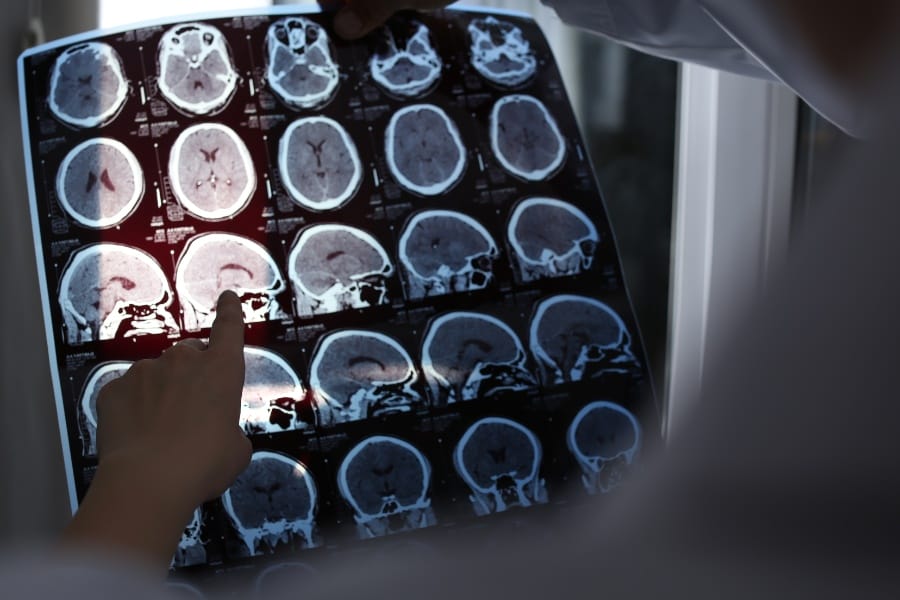About 400,000 people currently live with multiple sclerosis (MS) in the United States, with 10,000 new cases diagnosed every year.
That is the equivalent of 200 new cases per week. Learn more about this disease, including the types, symptoms, and treatments for multiple sclerosis.
Multiple sclerosis is a disease where areas of the central nervous system (the brain, optic nerves, and spinal cord) become inflamed, which damages the protective coating on the nerves.
Over time, the nerve cells within the CNS may also be damaged. This damage disrupts electrical signals, or nerve impulses so that messages from the brain and spinal cord to other parts of the body are disrupted and potentially delayed.
These delays in nerve impulses can cause a variety of symptoms. These symptoms are often unpredictable and may flare up and then subside over a few days, months, or even years. People living with MS may experience the following:
- Pain in the back or eyes
- Tremors in the hands or limbs
- Bladder dysfunction and bowel problems
- Fatigue, dizziness, poor balance, or weakness
- Mobility issues, stiffness, and muscle weakness
- Numbness or uncomfortable tingling
- Speech difficulties
- Heat sensitivity
- Partial or complete vision loss
- Swallowing disorders
- Anxiety or mood swings
Let’s dive a little deeper into exactly what multiple sclerosis is and some of the common MS symptoms.
What is Multiple Sclerosis?
IN THIS ARTICLE

Multiple sclerosis (MS) is a chronic, unpredictable disease that affects the central nervous system (CNS), which includes the brain, spinal cord, and optic nerves.
In MS, the immune system attacks the myelin sheath, a protective covering that surrounds nerve fibers and helps to transmit signals between the brain and the rest of the body.
As a result, communication between the brain and the body can be disrupted, leading to a wide range of symptoms.
The Role of the Immune System
The immune system plays a central role in the development of MS.
How does this impact individuals with MS? The immune system mistakenly attacks and damages the myelin sheath, which can lead to the formation of scar tissue (sclerosis) and a range of symptoms.
It is not yet clear what triggers the immune system to attack the myelin sheath, but it is thought to involve a combination of genetic and environmental factors.
Types of Multiple Sclerosis
There are several different types of MS, each with its own set of symptoms and progression.
Typically, patients experience Clinically Isolated Syndrome (CIS), which is the first neurologic event suggestive of MS. Depending on how the disease affects the body over time, there are 4 types of multiple sclerosis.
- Relapsing-Remitting MS (RRMS): This is the most common form of multiple sclerosis and affects about 85% of people living with MS. People with RRMS have temporary periods called relapses, flare-ups, or exacerbations, when new symptoms appear.
- Secondary-Progressive MS (SPMS): Most people who are diagnosed with RRMS will transition to SPMS. In SPMS, symptoms worsen more steadily over time, with or without the occurrence of relapses and remissions.
- Primary-Progressive MS (PPMS): This type is not very common, affecting about 10% of people with MS. It is characterized by slowly worsening symptoms from the beginning, with no relapses or remissions.
- Progressive-Relapsing MS (PRMS): This is a rare form that affects 5% of people with MS. It is characterized by a steadily worsening disease state from the beginning, with acute relapses but no remissions, with or without recovery.
The most common type of MS is relapsing-remitting MS (RRMS), which is characterized by periods of relapse (when symptoms worsen or new symptoms appear) followed by periods of remission (when symptoms improve or disappear).
Symptoms of MS and Diagnosis

Common Symptoms
As with any disease or illness, it is incredibly important to be aware of the symptoms. From MS to Parkinson’s Disease, symptoms are the little warning signs our bodies give us to let us know, hey, something is wrong.
The symptoms of MS can vary widely from person to person and can include:
- Fatigue
- Numbness or tingling in the limbs
- Muscle spasms
- Muscle stiffness
- Vision problems, such as blurred or double vision
- Balance problems and dizziness
- Weakness in the limbs
- Difficulty walking or standing
- Sexual dysfunction
These symptoms can come and go and may be mild or severe. They can also be unpredictable and may worsen over time.
Diagnosing MS
Diagnosing MS can be a complex process and often involves a combination of tests, evaluations, and reviewing your medical history. There is no single test that can definitively diagnose MS, but doctors will typically use a combination of the following:
- MRI: Magnetic Resonance Imaging (MRI) is a non-invasive test that uses powerful magnets and radio waves to create detailed images of the brain and spinal cord. This test can help doctors identify areas of inflammation or damage in the nervous system, which can be a sign of MS.
- Lumbar puncture: A lumbar puncture, also known as a spinal tap, is a procedure in which a small amount of cerebrospinal fluid (CSF) is removed from the spinal canal. CSF is the fluid that surrounds the brain and spinal cord, and testing it can help doctors identify certain markers of MS.
- Blood tests: Blood tests can help doctors rule out other conditions that may cause symptoms similar to MS.
Once a diagnosis of MS has been made, doctors will work with the patient to develop a treatment plan that addresses their symptoms and helps slow the progression of the disease.
Now, let’s take a look at what treatment methods are available for individuals with multiple sclerosis.
Multiple Sclerosis Treatment Methods
There are treatment options available to decrease the frequency of relapses and delay the disease progression; some are administered orally or intravenously, while other options may be via injection.
Available Treatments
There is currently no cure for multiple sclerosis (MS). However, there are a variety of treatments available that can help manage symptoms and slow the progression of the disease.
One common treatment for MS is the use of steroids. Steroids can help reduce inflammation and swelling in the central nervous system, which can help alleviate symptoms like numbness and tingling.
Beta interferons and glatiramer acetate are injectable medications that may be administered to patients who have experienced the first clinical episode and have MRI findings consistent with MS. Fingolimod, teriflunomide, and dimethyl fumarate are oral capsules used to treat relapsing forms of MS.
For patients with worsening RRMS, PRMS, or SPMS, mitoxantrone is administered intravenously to reduce neurologic disability and the frequency of clinical exacerbations.
Natalizumab is reserved for patients with rapidly progressing MS and is administered once every four weeks.
Managing Symptoms
In addition to medication, there are also a variety of strategies that can help manage the symptoms of MS. One important strategy is exercise. Exercise can help improve strength, balance, and coordination, which can help reduce the risk of falls and other accidents. Additionally, exercise can help improve mood and reduce fatigue.
Another important strategy for managing MS symptoms is vitamin D supplementation. Vitamin D is important for maintaining bone health and may also have anti-inflammatory effects.
Some studies have suggested that low levels of vitamin D may be associated with an increased risk of developing MS, so it is important for people with MS to get enough vitamin D.
Lifestyle and Home Remedies
In addition to medication and other treatments, there are also a variety of lifestyle and home remedies that can help manage MS symptoms.
One important strategy is to get plenty of rest and avoid overexertion. This can help reduce fatigue and prevent exacerbation of symptoms.
Another important strategy is to maintain a healthy diet. Eating a balanced diet that includes plenty of fruits, vegetables, and whole grains can help provide the body with the nutrients it needs to stay healthy and fight off infection.
Additionally, some people with MS may benefit from alternative therapies like acupuncture or massage therapy. It is important to talk to a healthcare provider before trying any alternative therapies to ensure that they are safe and effective.
Multiple Sclerosis Impact on Daily Life

Multiple sclerosis (MS) is a chronic disease that affects the central nervous system. The symptoms of MS can have a significant impact on a person’s daily life.
Physical and Emotional Challenges
MS can cause a range of physical symptoms, including difficulty with mobility, muscle weakness, and fatigue.
These symptoms can make it challenging to perform everyday activities such as walking, standing, and lifting. MS can also cause emotional challenges such as depression, anxiety, and mood swings. Unfortunately, it is common (and understandable) for these symptoms can make it difficult for a person to manage their daily life.
Quality of Life with MS
MS can impact a person’s quality of life in many ways.
The symptoms of MS can make it difficult for a person to participate in activities they enjoy, such as hobbies or sports. MS can also impact a person’s ability to work, which can lead to financial difficulties. Additionally, MS can affect a person’s relationships with family and friends, as well as their ability to participate in social activities.
To manage the impact of MS on daily life, many people with MS join support groups. These groups can provide emotional support and practical advice on managing the symptoms of MS.
Additionally, many people with MS work with healthcare professionals to develop a treatment plan that addresses their specific symptoms and needs.
Most people living with MS have a relatively normal lifespan. On average, they may live seven years less than the general population, but they often die from many of the same conditions as people without MS, such as heart disease and cancer.
In the last ten years, five new drugs have been developed to treat symptoms of MS. These findings are changing the way clinician’s approach the patient and the disease, and we are hopeful of more advances in MS treatments.
For most, the main concern is learning to cope with symptoms that may cause pain or discomfort. A private nurse can provide an extra level of skilled care to promote quality of life for the patient and their family.
Medication management, intravenous therapies, and palliative care are a few of the ways a private nurse can increase the overall comfort of the client.
Research and Future Directions
Current Research
Multiple sclerosis (MS) is a complex disease with an unknown cause, making research a crucial component in understanding and treating the disease.
Researchers are currently investigating various aspects of MS, including genetic and environmental factors, as well as the role of the Epstein-Barr virus and other autoimmune disorders.
Recent studies have shown that genetic factors play a significant role in the development of MS.
Researchers have identified more than 200 genetic variants that are associated with an increased risk of developing the disease. Additionally, environmental factors, such as exposure to certain toxins or infections, have been linked to an increased risk of developing MS.
The role of the Epstein-Barr virus, a common virus that causes infectious mononucleosis, in the development of MS is also being studied.
While it is not yet clear how the virus may contribute to the development of MS, researchers believe that it may trigger an autoimmune response in some individuals.
Emerging Therapies
While there is currently no cure for MS, there are several disease-modifying therapies (DMTs) available that can slow the progression of the disease and reduce the frequency of relapses.
However, these therapies are not effective for all individuals with MS, and there is a need for new and more effective treatments.
Researchers are currently exploring several emerging therapies for the treatment of MS, including stem cell therapy, gene therapy, and immunotherapy. Stem cell therapy involves using a patient’s own stem cells to repair damaged tissues in the central nervous system.
Gene therapy involves modifying a patient’s genes to correct defects that may contribute to the development of MS. Immunotherapy involves using drugs to modulate the immune system and prevent it from attacking the central nervous system.
Get the Best Private Care for Multiple Sclerosis
If your loved one is suffering from multiple sclerosis, a private in-home nurse can help. Did you know that in-home nursing care provides all of the same benefits of visiting a medical facility? Instead, your loved one can spend their time in the comfort of their home.
Learn more about NurseRegistry by clicking below.
Frequently Asked Questions about MS
What are the initial symptoms that indicate the possibility of multiple sclerosis?
The initial symptoms of multiple sclerosis (MS) may vary from person to person, but common symptoms include vision problems, muscle weakness or stiffness, difficulty with coordination and balance, and cognitive impairment. These symptoms may come and go, and can be mild or severe.
How is multiple sclerosis diagnosed?
There is no single test to diagnose MS. Diagnosis is typically made based on a combination of clinical symptoms, neurological exam, MRI scans, and other tests to rule out other conditions. A diagnosis of MS is usually made by a neurologist.
Can you explain the pathophysiology of multiple sclerosis?
MS is a chronic autoimmune disease in which the immune system attacks the myelin sheath that covers nerve fibers in the central nervous system. This results in damage to the nerve fibers, which can cause a variety of symptoms.
Is there a genetic component to the risk of developing multiple sclerosis?
While there is no clear genetic cause of MS, there is a genetic component to the risk of developing the disease. Studies have shown that having a family member with MS increases the risk of developing the disease.
What is the typical prognosis for someone diagnosed with multiple sclerosis?
The prognosis for MS varies depending on the individual and the course of the disease. Some people may experience only mild symptoms, while others may have more severe symptoms that progress over time. However, with proper treatment and management, many people with MS are able to lead full and productive lives.
Are there effective treatments available for managing multiple sclerosis?
There are several treatments available for managing MS, including medications to reduce inflammation, physical therapy to improve mobility and strength, and lifestyle changes to manage symptoms. These treatments can help slow the progression of the disease and improve quality of life.
Can you live a long life with MS?
Yes, many people with MS are able to live long and fulfilling lives. While there is no cure for MS, with proper treatment and management, many people are able to manage their symptoms and lead productive lives.
Can you fully recover from Multiple Sclerosis?
While there is no cure for MS, many people are able to manage their symptoms and lead productive lives with proper treatment and management. However, the course of the disease can be unpredictable, and some people may experience more severe symptoms than others.
What are the 4 stages of MS?
There is no set progression of MS, and the course of the disease can vary widely from person to person. However, some doctors may use a system of four stages to describe the progression of the disease, including relapsing-remitting, secondary-progressive, primary-progressive, and progressive-relapsing.
References
Hooper K.,“Managing Progressive MS,” New York, NY: National Multiple Sclerosis Society; 2011.
Kappos L, Polman CH., Freedman MS, et al., “Treatment with interferon beta-1b delays conversion to clinically definite and McDonald MS in patients with clinically isolated syndromes,” Neurology, 2006; 67: 1242-1249.
Madell, R., “Multiple Sclerosis Prognosis and Your Life Expectancy,” Healthline, December 12, 2016.
National Multiple Sclerosis Society, “The MS Disease – Modifying Medications,” New York, NY: National Multiple Sclerosis Society; 2012.
Rolak, L., “Multiple Sclerosis: It’s Not The Disease You Thought It Was,” Clinical Medical Research, 2003 Jan; 1(1): 57–60.
“The Multiple Sclerosis Process and Symptoms,” Multiple Sclerosis Association of America, 2017.
Taylor, D., “Multiple Sclerosis (MS Symptoms, Causes, and Life Expectancy),” MedicineNet, March 16, 2017.






